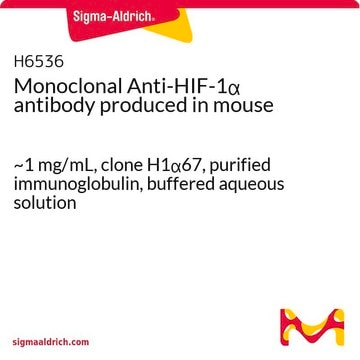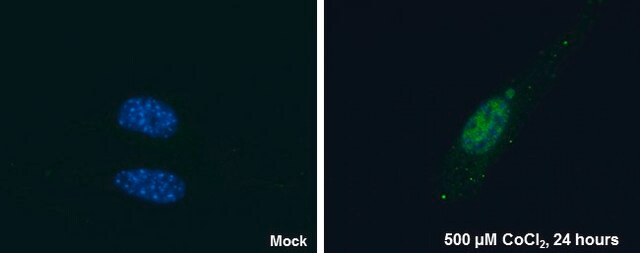H6411
Monoclonal Anti-HIF-1α antibody produced in mouse
~1 mg/mL, clone OZ12, purified immunoglobulin, buffered aqueous solution
Synonym(s):
Anti-Hypoxia Inducible Factor 1, α subunit
About This Item
Recommended Products
biological source
mouse
Quality Level
conjugate
unconjugated
antibody form
purified immunoglobulin
antibody product type
primary antibodies
clone
OZ12, monoclonal
form
buffered aqueous solution
mol wt
antigen 120 kDa
species reactivity
human
concentration
~1 mg/mL
technique(s)
immunoprecipitation (IP): 2 μg using 1 mg protein lysate
indirect immunofluorescence: 2 μg/mL
isotype
IgG1
UniProt accession no.
shipped in
wet ice
storage temp.
−20°C
target post-translational modification
unmodified
Gene Information
human ... HIF1A(3091)
Related Categories
Immunogen
Physical form
Disclaimer
Not finding the right product?
Try our Product Selector Tool.
Storage Class Code
10 - Combustible liquids
WGK
nwg
Flash Point(F)
Not applicable
Flash Point(C)
Not applicable
Certificates of Analysis (COA)
Search for Certificates of Analysis (COA) by entering the products Lot/Batch Number. Lot and Batch Numbers can be found on a product’s label following the words ‘Lot’ or ‘Batch’.
Already Own This Product?
Find documentation for the products that you have recently purchased in the Document Library.
Our team of scientists has experience in all areas of research including Life Science, Material Science, Chemical Synthesis, Chromatography, Analytical and many others.
Contact Technical Service





